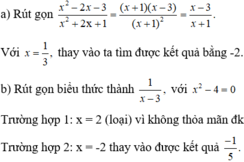
Hãy nhập câu hỏi của bạn vào đây, nếu là tài khoản VIP, bạn sẽ được ưu tiên trả lời.


Bài 1:
a) (3x - 2)(4x + 5) = 0
<=> 3x - 2 = 0 hoặc 4x + 5 = 0
<=> 3x = 2 hoặc 4x = -5
<=> x = 2/3 hoặc x = -5/4
b) (2,3x - 6,9)(0,1x + 2) = 0
<=> 2,3x - 6,9 = 0 hoặc 0,1x + 2 = 0
<=> 2,3x = 6,9 hoặc 0,1x = -2
<=> x = 3 hoặc x = -20
c) (4x + 2)(x^2 + 1) = 0
<=> 4x + 2 = 0 hoặc x^2 + 1 # 0
<=> 4x = -2
<=> x = -2/4 = -1/2
d) (2x + 7)(x - 5)(5x + 1) = 0
<=> 2x + 7 = 0 hoặc x - 5 = 0 hoặc 5x + 1 = 0
<=> 2x = -7 hoặc x = 5 hoặc 5x = -1
<=> x = -7/2 hoặc x = 5 hoặc x = -1/5

\(a,\left(x-1\right)\left(5x+3\right)=\left(3x-8\right)\left(x-1\right)\)
\(\left(x-1\right)\left(5x+3-3x+8\right)=0\)
\(\left(x-1\right)\left(2x+11\right)=0\)
\(\Rightarrow\orbr{\begin{cases}x-1=0\\2x+11=0\end{cases}\Rightarrow\orbr{\begin{cases}x=1\\2x=-11\end{cases}\Rightarrow}\orbr{\begin{cases}x=1\\x=-\frac{11}{2}\end{cases}}}\)
\(b,3x\left(25x+15\right)-35\left(5x+3\right)=0\)
\(15x\left(5x+3\right)-35\left(5x+3\right)=0\)
\(\left(5x+3\right).5\left(3x-7\right)=0\)
\(\Rightarrow\orbr{\begin{cases}5x+3=0\\5\left(3x-7\right)=0\end{cases}\Rightarrow\orbr{\begin{cases}5x=-3\\3x-7=0\end{cases}\Rightarrow}\orbr{\begin{cases}x=-\frac{3}{5}\\3x=7\end{cases}\Rightarrow}\orbr{\begin{cases}x=-\frac{3}{5}\\x=\frac{7}{3}\end{cases}}}\)

Bài 1:
a: \(=6x^3-10x^2+6x\)
b: \(=-2x^3-10x^2-6x\)
Bài 4:
a: =>3x+10-2x=0
=>x=-10
c: =>3x2-3x2+6x=36
=>6x=36
hay x=6
Bài 1:
\(a,=6x^3-10x^2+6x\\ b,=-2x^3-10x^2-6x\)
Bài 4:
\(a,\Leftrightarrow3x+10-2x=0\Leftrightarrow x=-10\\ b,\Leftrightarrow x\left(2x^2+9x-5\right)-\left(2x^3+9x^2+x+4,5\right)=3,5\\ \Leftrightarrow2x^3+9x^2-5x-2x^3-9x^2-x-4,5=3,5\\ \Leftrightarrow-6x=8\Leftrightarrow x=-\dfrac{4}{3}\\ c,\Leftrightarrow3x^2-3x^2+6x=36\Leftrightarrow x=6\)
Bài 1:
\(a,=7xy\left(2x-3y+4xy\right)\\ b,=x\left(x+y\right)-5\left(x+y\right)=\left(x-5\right)\left(x+y\right)\\ c,=\left(x-y\right)\left(10x+8\right)=2\left(5x+4\right)\left(x-y\right)\\ d,=\left(3x+1-x-1\right)\left(3x+1+x+1\right)\\ =2x\left(4x+2\right)=4x\left(2x+1\right)\\ e,=5\left[\left(x-y\right)^2-4z^2\right]=5\left(x-y-2z\right)\left(x-y+2z\right)\\ f,=x^2+8x-x-8=\left(x+8\right)\left(x-1\right)\\ g,\left(x+y\right)^3-\left(x+y\right)=\left(x+y\right)\left[\left(x+y\right)^2-1\right]\\ =\left(x+y\right)\left(x+y-1\right)\left(x+y+1\right)\\ h,=x^2+3x+x+3=\left(x+3\right)\left(x+1\right)\)

\(a,\)
\(2x^2-5x-7=0\)
\(\Leftrightarrow2x^2+2x-7x+7\)
\(\Leftrightarrow2x\left(x+1\right)-7\left(x+1\right)=0\)
\(\Leftrightarrow\left[{}\begin{matrix}x+1=0\\2x-7=0\end{matrix}\right.\)
\(\Leftrightarrow\left[{}\begin{matrix}x=-1\\x=\dfrac{7}{2}\end{matrix}\right.\)
\(\left(2x+2\right)\left(x+\dfrac{7}{2}\right)=0\)
\(\Leftrightarrow\left[{}\begin{matrix}2x+2=0\\x+\dfrac{7}{2}=0\end{matrix}\right.\)
\(\Leftrightarrow\left[{}\begin{matrix}x=-1\\x=-\dfrac{7}{2}\end{matrix}\right.\)
Vậy 2 pt ko tương đương
\(b,\left(2x-3\right)\left(x^2-4\right)=0\)
\(\Leftrightarrow\left[{}\begin{matrix}2x-3=0\\x^2-4=0\end{matrix}\right.\)
\(\Leftrightarrow\left[{}\begin{matrix}x=\dfrac{3}{2}\\x=\pm2\end{matrix}\right.\)
\(6x^2=24\Leftrightarrow x^2=4\Leftrightarrow x=\pm2\)
Vậy 2 pt tương đương
a: 2x^2-5x-7=0
=>2x^2-7x+2x-7=0
=>(2x-7)(x+1)=0
=>x=7/2 hoặc x=-1
(2x+2)(x+7/2)=0
=>(x+1)(x+7/2)=0
=>x=-7/2 hoặc x=-1
=>Hai phương trình ko tương đương
b: (2x-3)(x^2-4)=0
=>(2x-3)(x-2)(x+2)=0
=>\(x\in\left\{\dfrac{3}{2};2;-2\right\}\)
6x^2=24
=>x^2=4
=>x=2 hoặc x=-2
=>Hai phương trình ko tương đương

Bài 1:
a) Ta có: \(P=1+\dfrac{3}{x^2+5x+6}:\left(\dfrac{8x^2}{4x^3-8x^2}-\dfrac{3x}{3x^2-12}-\dfrac{1}{x+2}\right)\)
\(=1+\dfrac{3}{\left(x+2\right)\left(x+3\right)}:\left(\dfrac{8x^2}{4x^2\left(x-2\right)}-\dfrac{3x}{3\left(x-2\right)\left(x+2\right)}-\dfrac{1}{x+2}\right)\)
\(=1+\dfrac{3}{\left(x+2\right)\left(x+3\right)}:\left(\dfrac{4}{x-2}-\dfrac{x}{\left(x-2\right)\left(x+2\right)}-\dfrac{1}{x+2}\right)\)
\(=1+\dfrac{3}{\left(x+2\right)\left(x+3\right)}:\dfrac{4\left(x+2\right)-x-\left(x-2\right)}{\left(x-2\right)\left(x+2\right)}\)
\(=1+\dfrac{3}{\left(x+2\right)\left(x+3\right)}\cdot\dfrac{\left(x-2\right)\left(x+2\right)}{4x+8-x-x+2}\)
\(=1+3\cdot\dfrac{\left(x-2\right)}{\left(x+3\right)\left(2x+10\right)}\)
\(=1+\dfrac{3\left(x-2\right)}{\left(x+3\right)\left(2x+10\right)}\)
\(=\dfrac{\left(x+3\right)\left(2x+10\right)+3\left(x-2\right)}{\left(x+3\right)\left(2x+10\right)}\)
\(=\dfrac{2x^2+10x+6x+30+3x-6}{\left(x+3\right)\left(2x+10\right)}\)
\(=\dfrac{2x^2+19x-6}{\left(x+3\right)\left(2x+10\right)}\)

1) Ta có: \(x^2-4x+4=0\)
\(\Leftrightarrow\left(x-2\right)^2=0\)
\(\Leftrightarrow x-2=0\)
hay x=2
Vậy: S={2}

Bài 1
a/ \(x\left(x^2+1\right)+2\left(x^2+1\right)=0\)
\(\Leftrightarrow\left(x+2\right)\left(x^2+1\right)=0\Rightarrow x=-2\)
b/
\(\Leftrightarrow x^3-6x^2+9x+5x^2-30x+45=0\)
\(\Leftrightarrow x\left(x-3\right)^2+5\left(x-3\right)^2=0\)
\(\Leftrightarrow\left(x+5\right)\left(x-3\right)^2=0\)
\(\Rightarrow\left[{}\begin{matrix}x=-5\\x=3\end{matrix}\right.\)
1.
c/ \(\Leftrightarrow x^3+2x^2+2x+x^2+2x+2=0\)
\(\Leftrightarrow x\left(x^2+2x+2\right)+x^2+2x+2=0\)
\(\Leftrightarrow\left(x+1\right)\left(x^2+2x+2\right)=0\)
\(\Leftrightarrow\left[{}\begin{matrix}x=-1\\x^2+2x+2=0\left(vn\right)\end{matrix}\right.\)
d/
\(\Leftrightarrow x^4+x^3-2x^2-x^3-x^2+2x+4x^2+4x-8=0\)
\(\Leftrightarrow x^2\left(x^2+x-2\right)-x\left(x^2+x-2\right)+4\left(x^2+x-2\right)=0\)
\(\Leftrightarrow\left(x^2-x+4\right)\left(x^2+x-2\right)=0\)
\(\Leftrightarrow\left[{}\begin{matrix}x^2-x+4=0\left(vn\right)\\x^2+x-2=0\end{matrix}\right.\)
\(\Rightarrow\left[{}\begin{matrix}x=1\\x=-2\end{matrix}\right.\)

a) \(\Rightarrow x\left(x+3\right)=0\)
\(\Rightarrow\left[{}\begin{matrix}x=0\\x=-3\end{matrix}\right.\)
b) \(\Rightarrow x\left(x^2-4\right)=0\Rightarrow x\left(x-2\right)\left(x+2\right)=0\)
\(\Rightarrow\left[{}\begin{matrix}x=0\\x=2\\x=-2\end{matrix}\right.\)
c) \(\Rightarrow\left(x-1\right)\left(5x-1\right)=0\)
\(\Rightarrow\left[{}\begin{matrix}x=1\\x=\dfrac{1}{5}\end{matrix}\right.\)
d) \(\Rightarrow2\left(x+5\right)-x\left(x+5\right)=0\Rightarrow\left(x+5\right)\left(2-x\right)=0\)
\(\Rightarrow\left[{}\begin{matrix}x=-5\\x=2\end{matrix}\right.\)
e) \(\Rightarrow2x^2-10x-3x-2x^2=26\)
\(\Rightarrow-13x=26\Rightarrow x=-2\)
f) \(\Rightarrow\left(x-2012\right)\left(5x-1\right)=0\)
\(\Rightarrow\left[{}\begin{matrix}x=2012\\x=\dfrac{1}{5}\end{matrix}\right.\)

a) Ta có: \(\left(x^2-2x\right)^2-6x^2+12x+9=0\)
\(\Leftrightarrow\left(x^2-2x\right)^2-6\left(x^2-2x\right)+9=0\)
\(\Leftrightarrow\left(x^2-2x-3\right)^2=0\)
\(\Leftrightarrow x^2-2x-3=0\)
\(\Leftrightarrow x^2-3x+x-3=0\)
\(\Leftrightarrow x\left(x-3\right)+\left(x-3\right)=0\)
\(\Leftrightarrow\left(x-3\right)\left(x+1\right)=0\)
\(\Leftrightarrow\left[{}\begin{matrix}x-3=0\\x+1=0\end{matrix}\right.\Leftrightarrow\left[{}\begin{matrix}x=3\\x=-1\end{matrix}\right.\)
Vậy: S={3;-1}
b) Ta có: \(\left(x^2+x+1\right)\left(x^2+x+2\right)=12\)
\(\Leftrightarrow\left(x^2+x\right)^2+3\left(x^2+x\right)+2-12=0\)
\(\Leftrightarrow\left(x^2+x\right)^2+5\left(x^2+x\right)-2\left(x^2+x\right)-10=0\)
\(\Leftrightarrow\left(x^2+x\right)\left(x^2+x+5\right)-2\left(x^2+x+5\right)=0\)
\(\Leftrightarrow\left(x^2+x+5\right)\left(x^2+x-2\right)=0\)
\(\Leftrightarrow x^2+x-2=0\)(Vì \(x^2+x+5>0\forall x\))
\(\Leftrightarrow x^2+2x-x-2=0\)
\(\Leftrightarrow x\left(x+2\right)-\left(x+2\right)=0\)
\(\Leftrightarrow\left(x+2\right)\left(x-1\right)=0\)
\(\Leftrightarrow\left[{}\begin{matrix}x+2=0\\x-1=0\end{matrix}\right.\Leftrightarrow\left[{}\begin{matrix}x=-2\\x=1\end{matrix}\right.\)
Vậy: S={-2;1}
2 ý a và b anh CTV nãy đã làm rồi nha, còn câu c này thì làm dài dòng+không chắc :VVV
c)\(\left(2x^2-3x+1\right)\left(2x^2+5x+1\right)-9x^2=0\)
\(\Leftrightarrow\left(2x^2-3x+1\right)\left(2x^2-3x+1+8x\right)-9x^2=0\)
\(\Leftrightarrow\left(2x^2-3x+1\right)^2+8x\left(2x^2-3x+1\right)+16x^2-25x^2=0\)
\(\Leftrightarrow\left(2x^2-3x+1+4x\right)^2-25x^2=0\)
\(\Leftrightarrow\left(2x^2+x+1\right)^2-25x^2=0\)
\(\Leftrightarrow\left(2x^2+x+1-5x\right)\left(2x^2+x+1+5x\right)=0\)
\(\Leftrightarrow\left(2x^2-4x+1\right)\left(2x^2+6x+1\right)=0\)
\(\Rightarrow\left[{}\begin{matrix}\left(2x^2-4x+1\right)=0\\\left(2x^2+6x+1\right)=0\end{matrix}\right.\)
Rồi đến đây tự giải nhé, không phân tích được thì bấm máy tính là ra nha:vv

a. x2 - 2x - 3 = 0
<=> ( x2 + x ) - ( 3x + 3 ) = 0
<=> x ( x + 1 ) - 3 ( x + 1 ) = 0
<=> ( x - 3 ) ( x + 1 ) = 0
<=> x = 3 hoặc x = - 1
b. 2x2 - 3 + 5x = 0
<=> 2 ( x2 + 5/2x - 3/2 ) = 0
<=> ( x2 + 5/2x + 25/16 ) - 49/16 = 0
<=> ( x + 5/4 )2 = 49/16
<=>\(\orbr{\begin{cases}x+\frac{5}{4}=\frac{7}{4}\\x+\frac{5}{4}=-\frac{7}{4}\end{cases}}\)<=>\(\orbr{\begin{cases}x=\frac{1}{2}\\x=-3\end{cases}}\)
a) \(x^2-2x-3=0\)
\(x^2-2x+1-4=0\)
\(\left(x-1\right)^2-4=0\)
\(\left(x-1-2\right)\left(x-1+2\right)=0\)
\(\left(x-3\right)\left(x+1\right)=0\)
\(\Rightarrow\orbr{\begin{cases}x-3=0\\x+1=0\end{cases}\Rightarrow}\orbr{\begin{cases}x=3\\x=-1\end{cases}}\)
b) \(2x^2-3+5x=0\)
\(2x^2-3+6x-x=0\)
\(\left(2x^2+6x\right)-\left(3+x\right)=0\)
\(2x\left(x+3\right)-\left(3+x\right)=0\)
\(\left(x+3\right)\left(2x-1\right)=0\)
\(\Rightarrow\orbr{\begin{cases}x+3=0\\2x-1=0\end{cases}\Rightarrow}\orbr{\begin{cases}x=-3\\x=\frac{1}{2}\end{cases}}\)